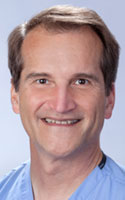‘Your heart is designed to last 110 to 120 years if you take care of it.’
By Ernst Lamothe Jr

Heart disease describes a range of conditions that affect your heart, which includes blood vessel diseases, such as coronary artery disease, heart rhythm problems and congenital heart defects. However, it is the variety or unhealthy behaviors we exhibit that can increase the probability of these symptoms.
“If your heart stops for five seconds, you pass out. If it stops for eight or 10 minutes, you have permanent brain damage,” said physician Gerald (Gerry) Gacioch, chief of cardiology at Rochester General. “Even though there have been tremendous advancements in artificial heart replacements, the best solution is keeping the heart you were born with working well.”
Gacioch offers five tips to better heart health.
1. Diet
While the adage “you are what you eat” has been battered about, it remains true. And what you eat has significant consequences to your heart, arteries and other organs. Doctors recommend a more plant-based diet while reducing the amount of red meats such as beef, pork or lamb. Medical experts believe in good fats such as avocados and low-fat yogurt. A poor diet leads to an increase of diabetes along with arthritis and musculoskeletal risk.
“One of the biggest issues we have in our country is that people are eating too many calories,” said Gacioch. “We don’t eat in moderation and we consume too many carbohydrates and saturated fats. Obesity can be the beginning of various health ailments.”
2. Exercise
Many vascular issues where there are blockages lead to heart diseases. While not all of them are preventable, medical experts say lack of a good diet mixed with too-little exercise leads to a host of problems. Something as simple as walking regularly let alone going to the gym can make a world of difference.
“As a country, we have become very sedentary,” said Gacioch. “When you walk, swim, run, exercise or do any continuous movement for 30 minutes a day, it can change your health dramatically. I know in Upstate New York when it gets colder, the motivation may not be there but you have to push through it and exercise has to be a part of your life all year around. I have patients in my 90s who still walk.”
3. No smoking
Smoking is known to lead to heart disease, stroke, cancers and death.
“Simply put, there is absolutely no health benefits to smoking. That is an easy one to cut out of your life if you want better heart health,” said Gacioch. “We were having an incredible trend with the reduction of smoking. When I first started practicing in 1990, there was a 40% smoking rate in the population. It has significantly decreased.”
Gacioch added though the problem is the increase in e-cigarettes and vaping. Vaping is the act of inhaling and exhaling the aerosol, often referred to as vapor, which is produced by an e-cigarette or similar device. Nicotine is the primary agent in both regular cigarettes and e-cigarettes, and it is highly addictive. It causes you to crave a smoke and suffer withdrawal symptoms if you ignore the craving. Nicotine is also a toxic substance. It raises your blood pressure and spikes your adrenaline, which increases your heart rate and the likelihood of having a heart attack.
4. Know your numbers
Gacioch said it’s essential to understand your health numbers from blood pressure to cholesterol. To understand high blood cholesterol, it helps to learn about cholesterol. Cholesterol is a waxy, fat-like substance that’s found in all cells of the body. Your body needs some cholesterol to make hormones, vitamin D, and substances that help you digest foods. However, we also put food in our bodies that elevate our cholesterol.
“This is one of the reasons why we stress going to your doctor regularly and even starting this habit when you are young,” he said. “When you are 18, if you have high blood pressure or cholesterol there are so many things we can do because it was caught early. When it is caught in your 50s and older, then some of your arteries might have hardened and often the vascular issues are much worse.”
5. Avoid stress
While that task is easier said than done, maintaining an even keel and lowering your stress is paramount to good health, said Gacioch.
“I remember when I first came to Rochester in 1990, there was a wave of layoffs from Kodak and Xerox. You always knew right before it was going to happen because you had middle managers who were the ones in charge of firing coming into the hospital having severe heart problems, heart attacks and even passing away from cardiac arrest,” said Gacioch.
“Once people start losing heart muscle it may still function but you will start to see consistency issues and problems with stamina,” added Gacioch.
“Your heart is designed to last 110 to 120 years if you take care of it.”
